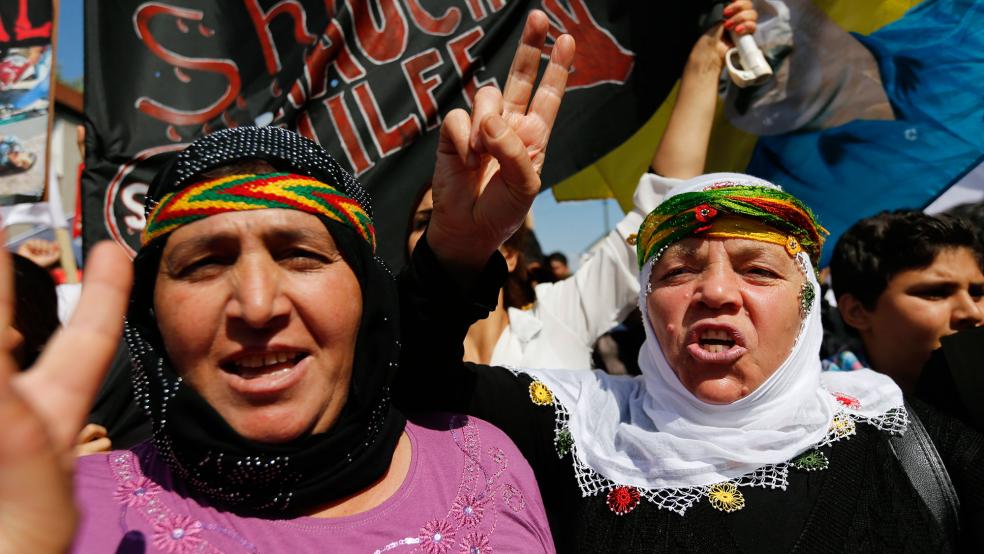As an Illinois politician and a presidential candidate, President Obama made clear that he thought the Iraq war was a grievous mistake. As president, he attempted to disown the war by pulling out all American troops and trusting Iraqis with their own country’s fate.
Now, as American fighter jets circle the skies over Iraq, dropping bombs in an attempt to stop a rogue and deadly terrorist organization bent on forming an Islamic caliphate in the Middle East, Iraqis and the entire region is paying for a miscalculation on an issue that is the centerpiece of Obama’s foreign policy.
Related: With Iraq in Ruins, ISIS Turns to Genocide
As the war debate raged in 2002, Obama, then an Illinois state senator spoke out strongly against the war, rallying liberal opposition. He characterized the conflict as a monumental mistake championed by “armchair, weekend warriors in this [Bush] administration to shove their own ideological agendas down our throats, irrespective of the costs in lives lost and in hardships borne.”
“What I am opposed to is a dumb war. What I am opposed to is a rash war,” he said in 2002. “A war based not on reason but on passion, not on principle but on politics… I know that an invasion of Iraq without a clear rationale and without strong international support will only fan the flames of the Middle East, and encourage the worst, rather than best, impulses of the Arab world, and strengthen the recruitment arm of al-Qaeda.”
One of the primary reasons that Obama beat Hillary Clinton in 2008 is that he opposed the war and that she was for it. Opposition to involvement in Iraq is in Obama’s political DNA: it’s difficult to envision him as the transformational politician he became without it.
Perhaps Obama was initially right on the Iraq war. But as president, Obama could no longer pretend the war only belonged to George W. Bush. It belonged to him, the military, and public. Whether or not Obama liked it, Iraq was America’s war.
As Colin Powell warned President Bush before the war began, if the United States breaks Iraq, it is responsible for buying it and ensuring it remained stable. When Obama became president, he inherited the war as much as he inherited the Oval Office and Lincoln bedroom. It came with the job, but Obama wanted no part in it.
Related: How the U.S. Allowed ISIS to Form a Terrorist Army
His decision to remove all American military personnel and disengage politically while backing Prime Minister Nouri al-Maliki, who he trusting to run the country, was an attempt to disown it. His refusal to intervene meaningfully as Maliki systematically targeted Sunni Muslims -- the core of ISIS -- was an exercise in misplaced hope.
Now, the president, the Iraqis and the wider Middle East are paying the price. ISIS already has an army and effectively controls an area larger than some countries. The president would prefer a short engagement, but he admitted Saturday that this campaign could take some time.
“I don’t think we’re going to solve this problem in weeks,” Obama said. “This is going to be a long-term project.”
It remains to be seen whether air strikes would be enough. Even as the president continues to insist that no American boots would be on the ground in Iraq, the possibility looms over the current air campaign. Just a few weeks ago, Obama said that the United States would not use any kind of force to confront ISIS.
Related: How Saddam Hussein Made the Middle East Stable
“The cavalry is not coming to the rescue,” Obama said in an interview with New York Times columnist Tom Friedman. The president then added, “We’re not going to let them create some caliphate through Syria and Iraq. But we can only do that if we know that we have got partners on the ground who are capable of filling the void.”
Meanwhile, the people of Iraq continue to be held at knifepoint by ISIS. The humanitarian crisis that has trapped up to 40,000 Yazidi Christians on top of Mount Sinjar in northern Iraq continued Saturday. ISIS has pledged to massacre the Yazidis and other Christian groups, promoting calls of genocide from Christian leaders.
“Now we consider it genocide – ethnic cleansing," Archbishop Athanasius Toma Dawod of the Syriac Orthodox Church told The Guardian. "They are killing our people in the name of Allah and telling people that anyone who kills a Christian will go straight to heaven: that is their message. They have burned churches; they have burned very old books. They have damaged our crosses and statues of the Virgin Mary. They are occupying our churches and converting them into mosques."
The rest of the Middle East is also watching the American intervention carefully. ISIS has pledged to plunder and conquer the region, from Jordan to Israel to Lebanon.
If the United States cannot stop the group in Iraq, it would be very difficult to target them via airstrikes in a wider area. If ISIS were to expand operations beyond Iraq and Syria, it could lead to a Holy War for the fate of the Middle East.
Top Reads from The Fiscal Times





